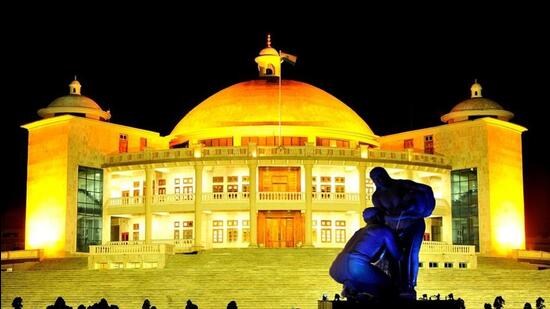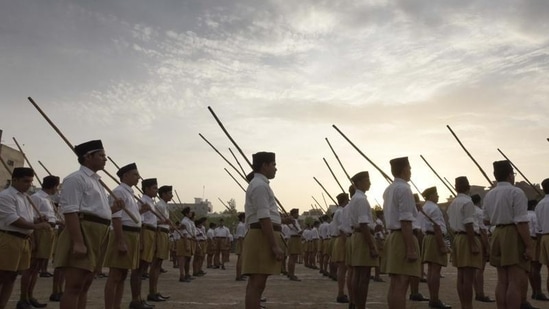The phase II compensatory package worth ₹13.30 crore will benefit 2,070 farmers whose agricultural fields have failed due to the present situation in the state
The Manipur cabinet has approved the second phase of compensatory packages for farmers affected by unprecedented conflict in the state under the scheme of the ministry of home affairs.

“The phase II compensatory package worth ₹13.30 crore will benefit 2070 farmers whose agricultural fields have failed due to the present situation in the state,” state health minister Dr Sapam Ranjan Singh, who also holds the information and public relations portfolio said.
Also Read: Manipur bans renaming of places, makes it punishable by up to 3 years in jail
On March 11, the Manipur government distributed benefits worth ₹18.91 crore under Phase I compensatory packages for 3,483 farmers.
It may be noted that hundreds of acres of agricultural fields at the fringes of the valley and lying at the foothills have been wasted and left unattended due to threats posed by the ongoing conflict in the state.
According to a study by the state agriculture department, as many as 5,901 farmers were found affected.
PROMOTED
‘Ambani ne bana di jodi’: Fans ship Hardik Pandya & Ananya Panday amid divorce rumours under their viral dance videoHindustan Times
Kerala influencer, mistaken for Captain Anshuman Singh’s wife Smriti Singh, faces vicious trollingHindustan Times
YouTuber Dhruv Rathee summoned by Delhi court in defamation case filed by BJP leaderHindustan Times
‘Behen tera career bhi nahi hai’: Shanaya Kapoor trolled for arguing with security at Anant Ambani’s wedding; watchHindustan Times
Fans relieved on learning the real reason behind Abhishek Bachchan’s like on post about divorce. Here’s what it meantHindustan Times
Khloe Kardashian calls Manish Malhotra a ‘local designer’ as she wears his design for Ambani eventHindustan Times
Kim Kardashian can’t get enough of Aishwarya Rai: Check out all their photos together from Ambani wedding in MumbaiHindustan Times
Internet defends Shloka Mehta for struggling to stay awake at Anant Ambani’s post-wedding event: ‘She has 2 kids’Hindustan Times
News / Cities / Other Cities / Manipur approves compensatory packages for violence affected farmers
You May Like
Young Millionaire From New Delhi Tells How She Got RichSetfieseepRead More
Amazon CFD: Your Route to a Second IncomeFXRDLearn More
Salman Khan ‘caught’ staring at Kim Kardashian in unseen Ambani wedding video; fans react: ‘What is this behaviour…’Hindustan Times
Promoted Links Next Story
Why the influential Ezhava community in Kerala is leaning towards the Sangh Parivar
Jul 25, 2024 08:30 AM IST
The BJP believes that the strong support from the Ezhava community contributed significantly to its better performance in the general election
When the Sree Narayana Dharma Paripalana Yogam, better known as SNDP, began operating in 1903 to spread the teachings of iconic social reformer Sree Narayana Guru, it marked the start of an era of scientific thinking, logical ideas, and rational perspectives in Kerala.

This was a significant development in a region divided into the princely states of Travancore, Kochi, and the British Malabar and immersed in numerous obscurantist practices.
Despite the organisation’s primary membership being from the influential OBC community, Ezhava, and its founders, P. Palpu and Kumaran Asan, were steadfast in maintaining SNDP as a secular, progressive, and all-encompassing entity. Their vision was to uphold Guru’s philosophy of “Ask not, say not, think not caste.”
Historical records show that Guru was determined not to let SNDP become an extension of the caste-based organisations Thyya Maha Sabha and Ezhava Sabha. These organisations, which rejected his reformist legacy, were subservient to Brahminism, and promoting equality among social outcasts was not part of their agenda.
Over time, SNDP evolved into a symbol of Malayalee pride, significantly influencing Kerala society by embracing progressive values.
Guru’s radical thinking and significant influence over a diverse population, transcending caste barriers, created a fertile environment for Kerala’s left politics to flourish. Many followers of the 19th-century reformer, who helped the Ezhava community overcome untouchability and discrimination, became the founding members of the Undivided Communist Party, which took root in the 1930s. Over the years, the Ezhava community has become the backbone of both CPI and CPI (M), with many leaders and cadres coming from it.
The Ezhavas, Kerala’s largest Hindu caste group, constitute around 23% of the state’s population. With a population of over six million, this community predominantly resides in southern Kerala and has consistently supported the Left in elections.
When the CPI (M) appointed V. S. Achuthananthan as chief minister in 2006, it was a testament to the community’s unwavering support. The current chief minister, Pinarayi Vijayan, also belongs to this community.
Lately, however, Left leaders have accused the present leadership of the SNDP of trying to align with the Sangh Parivar.
They claim that the left parties’ significant loss in the Kerala election was due to the SNDP handing over Ezhava votes to the BJP. They accuse the SNDP’s general secretary, Vellappally Natesan, and his politician son, Thushar Vellappally, of being tools of fundamentalist forces aiming to divide society.
Natesan accepts the allegation, saying that the Ezhavas are joining the Hindutva fold after finding it tough to deal with the Left, alleging that they follow a policy of appeasing Muslims. He says it would be natural for backward classes to revolt once their so-called protectors just treat them as vote banks and abandon them to give undue favours to minority communities.
“Consider this paradox: despite Guru’s teachings that manufacturing and selling liquor is a great sin, a liquor baron and his politician son have managed to control SNDP over the years. They have contradicted Guru’s anti-caste philosophy by emphasising the difficulty of avoiding considering caste or religion in today’s Kerala. This behaviour has led to accusations that Natesan and his family are selling the community to the Sangh Parivar to protect their business and political interests,” said K T Kunhikkannan, director of CPI(M) think-tank M K Kelu Study and Research Centre.
The BJP, which increased its vote share to nearly 20% in this election, believes that the strong support from the Ezhava community contributed significantly to its better performance in the Thiruvananthapuram, Alappuzha, Alathur, Attingal, and Kottayam constituencies. The party won Thrissur, with actor-turned-politician Suresh Gopi securing the party’s first Lok Sabha seat in Kerala.
Based on the division of the votes polled in the Lok Sabha election, the BJP emerged first in 14 assembly constituencies across the state, a first in history.
The political landscape in Alappuzha saw a significant shift, with the BJP candidate Sobha Surendran, who belongs to the Ezhava community, gaining ground over CPI(M)’s AM Ariff in several areas. Despite the CPI(M) securing the only seat in the 2019 Lok Sabha polls, AICC general secretary KC Venugopal wrested the constituency from Ariff this time.
Natesan wrote an article in the SNDP mouthpiece Yoga Nadam, accusing the CPI(M) and CPI of appeasing Muslims by giving them more than a fair share of Rajya Sabha seats from the state. He mentioned that out of the nine Rajya Sabha nominated MPs, five are from the Muslim community, and two are from the Christian community.
The BJP leadership has supported Vellappally’s assertions. Alappuzha BJP district president MV Gopakumar said that the party had only 40,000 votes in Alappuzha in 2014. “It went up to 140,000 in 2019, and this time it is nearly 300,000. This change was not sudden but slow and gradual. Many people from CPI(M) have switched to BJP in the last few years,” he said.
While Natesan’s leaning towards the Sangh Parivar began years ago, the Vijayan government appointed him as the vice-chairman of a state-level body for the protection of renaissance values after the BJP-RSS made the women’s entry to Sabarimala a controversial issue.
However, a Muslim body member resigned, citing objections to Natesan’s communal stand. Many members of the body, which is supposed to protect the inclusive and progressive characteristics of the state, have urged the chief minister to reconstitute it and remove Natesan from his position.
“The Muslims, who make up 17% of Kerala’s population, control the majority of schools and colleges in the six districts of northern Kerala. Furthermore, Arabic is being taught in schools at government expense,” Natesan added.
The state secretary of CPI(M), M V Govindan, stated that progressives within the SNDP Yogam, influenced by Guru’s teachings, must guide the organisation in the right direction and prevent its leadership from veering towards the right. So far, Vijayan has not addressed this issue, possibly due to his personal relationship with Natesan.
“Since the 1940s, the Ezhava community has been the backbone of the Communists. Ninety-nine percent of the martyrs of Communist agitations are from our community. But we have been trampled upon and not given our share of political and social power,” said Natesan when the Hindustan Times contacted him over the phone.
Natesan’s attempts to bring the Ezhavas closer to the Hindutva fold are seen as undermining the community’s struggle against caste hierarchies. Historian K N Ganesh said: “Guru’s campaign against caste adopted simple, common sense means. As Ezhavas were denied the right of worship in temples, he consecrated a Shiva Linga at Aruvippuram near Trivandrum in 1888. In two temples, he put up mirrors where the deity is usually placed, making his message clear. He strongly advocated internal reform among Ezhavas.”
In the 19th century, temples in Kerala became inaccessible to the Ezhavas, traditionally engaged in farming and tapping toddy. They were required to pay head tax, known as , while Ezhava women were forced to pay breast tax, known as .
There is growing pressure within the community against Natesan as well. The Sivagiri Mutt, which follows the ideals of Guru and is involved in various socially oriented activities, has said that SNDP has deviated from its core teachings.
The Sivagiri Mutt recently passed a resolution condemning the politicisation of the Guru’s teachings. Although it was directed at Natesan, no names were mentioned. The Mutt stated that the politicisation was an attempt to sabotage the image of the Sivagiri Mutt and the Guru.
Continue reading with HT Premium Subscription
Daily E Paper I Premium Articles I Brunch E Magazine I Daily Infographics
Already Subscribed? Sign In

Next Story
Assam: Women’s civil body write to HM Shah, demand SIT probe into custodial deaths
Jul 25, 2024 09:06 AM IST
The memorandum claimed that the incident was a gross violation of human rights, fundamental rights, and constitutional protections guaranteed to the people by a section of the Assam police
The Hmar Women Association, a civil body of the Hmar women community, submitted a memorandum to Union home minister Amit Shah on Wednesday, requesting the commissioning of a Special Investigation Team (SIT) to investigate the alleged extra-judicial actions by the Assam Police in connection with the death of three Hmar individuals on July 16.

The memorandum claimed that the incident was a gross violation of human rights, fundamental rights, and constitutional protections guaranteed to the people by a section of the Assam police.
Looking to become a technology leader? Embark on this journey with MIT’s Technology Leadership and Innovation Program Download FREE brochure now!
Also Read: UP DGP issues guidelines to curb custodial deaths
According to the memorandum, three individuals were convicted by the Assam Police without trial as per the procedure laid down by law.
The failure to notify them of the arrest is a violation of another fundamental right guaranteed under Article 22(2).
The memorandum demanded an impartial investigation headed by a Supreme Court judge, stating that it is an absolute necessity to maintain integrity and credibility in the process, it added.
Meanwhile, a protest rally was jointly organised in the Churachandpur district of Manipur, headed by the Hmar Women Association and the Kuki Women Organisation for Human Rights on Wednesday.
A similar protest was also organised in Manipur’s Tengnoupal district, Haflong, Senvon, Chandel, and Phaiton, Jiribam district.
Read MoreNext Story
RO/ARO paper leak: HC bail to alleged mastermind, Gangsters’ Act case keeps him in jail
ByJItendra Sarin, Prayagraj
Jul 25, 2024 06:50 AM IST
A criminal case was registered against him in the paper leak case at the Civil Lines police station, Prayagraj
The Allahabad high court has granted bail to one Rajeev Nayan Mishra alias Rahul Mishra, the alleged mastermind and accused in the paper leak of review officer (RO)/assistant review officer (ARO) examination.

A criminal case was registered against him in the paper leak case at the Civil Lines police station, Prayagraj. Subsequently, a case under the Gangsters’ Act was also registered against him by the Kaushambi police.
Looking to become a technology leader? Embark on this journey with MIT’s Technology Leadership and Innovation Program Download FREE brochure now!
Though Mishra has been released on bail in the case registered at Civil Lines, he will not be able to walk free, as he still has to obtain bail in the Gangsters’ Act case.
According to the counsel for the applicant, Pranvesh, justice Sanjay Kumar Pachori granted bail to Mishra on Wednesday after hearing both sides. He had taken the plea that other co-accused in this case had already been released on bail, therefore, the applicant too was entitled for bail on the ground of parity.
It is alleged that earlier Mishra was also the mastermind in the paper leak case of police constable recruitment exam.
Read MoreNext Story
Undertrial in handcuffs disallowed entry to Taj
ByHemendra Chaturvedi, Agra
Jul 24, 2024 07:50 PM IST
Leave a Reply